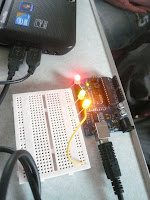Today was the start of something good and I really felt that especially after I had finished talking and got to see everyone else talking to one another. I started the session with a short 30 minute talk outline first what I have done, what I hope to achieve with these sessions and what I hope we as a group and individuals will go on to do afterwards. I talked about how we were funded through
peoplefund.it and who has sponsored us with equipment.

I called it the "Opening Night" to borrow from the art world, this is a
computing club, but it is very much geared towards getting people to put
what they have created on display. I talked about the subjects we will be covering Game Maker, Processing, Arduino, LEGO Mindstorms, sound and animation. I also gave a demo of Processing and Augmented Reality which I also let the students try out.
I then stopped talking and started asking questions about what the group want out of these sessions, we also had cake at this point. It was great and the group already has a good feeling to it, the students were already beginning to talk to each other. I also got the students to introduce themselves, their computing experience and general interests. Minecraft appears to be very popular so I might have to contact them regarding using that in education.
Chris from Rapid Electronics also made it to drop off a load of much needed components, multi-meters a stationary, at which point we had a good rummage. Thanks to all at Rapid.
I made it very clear to the parents that they are welcome to attend all the sessions and to ask questions as I am very much a fan of families working together especially while learning.
I am really pleased with how it turned out and I really felt it important that the parents and students got to meet me before I start with the teaching. Even though my teaching style is fairly informal, I wanted to the introduction the me and the sessions to be really relaxed. I wanted the students to know they are not being assessed, we are only here to learn and learn about the things they are interested in. One of the parents said their child was worried it would be like "more school", I think they are now aware of how different these sessions will be in comparison to a lot of assessment based activities. The ethos of the project is to provide a safe, friendly and supportive environment to either learn in groups or on their own, they can either join in on that weeks topic or continue on with an subject they are more interested in.
Next week we kick off with Game Maker, I will also be joined by two Degree students that I have taught on the UCS Games Design course. I think it good to have some of the degree students as they will be also able to explain their experiences as a Game Design student (and they are only a few years older than the students), which I think a few of these students will be interested in. Additionally it will provide the degree students with some teaching experience. So it is good news all round.

















